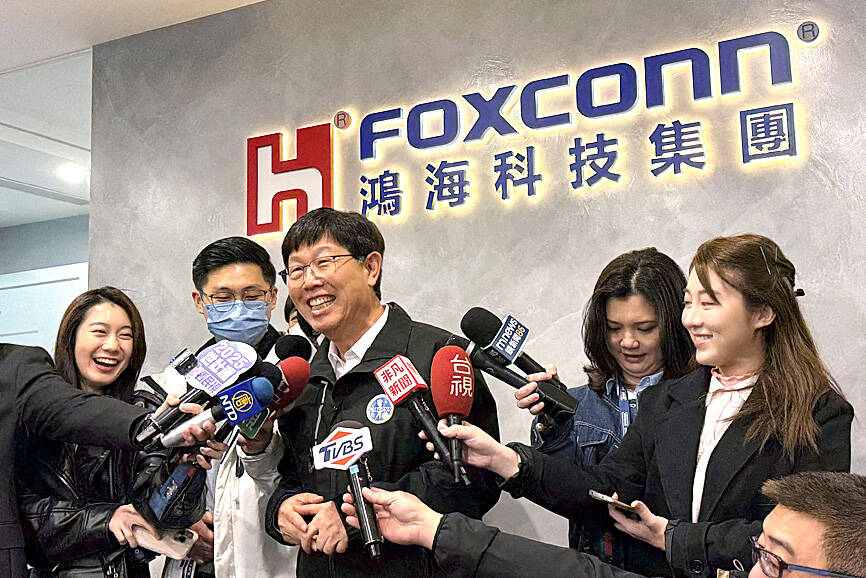Hon Hai Precision Industry Co (鴻海精密), the world’s largest contract electronics maker, posted its highest-ever first-quarter revenue on strong demand for artificial intelligence (AI) products, but said it would need to closely watch global politics.
Revenue for Apple Inc’s biggest iPhone assembler jumped 24.2 percent year-on-year to NT$1.64 trillion (US$49.5 billion), Hon Hai said in a statement on Saturday, just missing the NT$1.68 trillion LSEG SmartEstimate, which gives greater weight to forecasts from analysts who are more consistently accurate.
Robust AI demand led to strong revenue growth for Hon Hai’s cloud and networking products division, said the company, also known as Foxconn Technology Group (富士康科技集團), whose customers include AI chip firm Nvidia Corp.

Photo: Lee Wen-Yee, Reuters
For smart consumer electronics, which includes iPhones, there was “flattish” year-on-year growth, Hon Hai said.
The company said it anticipates growth this quarter from the previous three months and from the same period last year.
However, “the impact of evolving global political and economic conditions will need continued close monitoring,” it said, without elaborating.
US President Donald Trump last week slapped additional 34 percent tariffs on Chinese goods, bringing the total new levies this year to 54 percent on the country. The Chinese city of Zhengzhou is home to the world’s largest iPhone manufacturing facility, operated by Hon Hai.
Trump also put a 32 percent tariff on Taiwan, although the bulk of Hon Hai’s factories are overseas.
The US’s reciprocal tariffs on regions such as Taiwan, Vietnam and India — key beneficiaries of the “China Plus One” strategy — could place mounting pressure on electronics manufacturing services firms such as Hon Hai and Quanta Computer Inc (廣達電腦), potentially impeding both margins and demand, Bloomberg Intelligence analysts said in a note.
Hon Hai does not provide numerical forecasts. The company would report its full first-quarter earnings on May 14.
Hon Hai chairman Young Liu (劉揚偉) last month said the company was exploring ways to expand production in several US states. Earlier this year, Apple said it was partnering with Hon Hai to begin making servers in Houston. Other Taiwanese electronics manufacturers are also following suit.
Additional reporting by Bloomberg

In a small town in Paraguay, a showdown is brewing between traditional producers of yerba mate, a bitter herbal tea popular across South America, and miners of a shinier treasure: gold. A rush for the precious metal is pitting mate growers and indigenous groups against the expanding operations of small-scale miners who, until recently, were their neighbors, not nemeses. “They [the miners] have destroyed everything... The canals, springs, swamps,” said Vidal Britez, president of the Yerba Mate Producers’ Association of the town of Paso Yobai, about 210km east of capital Asuncion. “You can see the pollution from the dead fish.

MULTIFACETED: A task force has analyzed possible scenarios and created responses to assist domestic industries in dealing with US tariffs, the economics minister said The Executive Yuan is tomorrow to announce countermeasures to US President Donald Trump’s planned reciprocal tariffs, although the details of the plan would not be made public until Monday next week, Minister of Economic Affairs J.W. Kuo (郭智輝) said yesterday. The Cabinet established an economic and trade task force in November last year to deal with US trade and tariff related issues, Kuo told reporters outside the legislature in Taipei. The task force has been analyzing and evaluating all kinds of scenarios to identify suitable responses and determine how best to assist domestic industries in managing the effects of Trump’s tariffs, he

TIGHT-LIPPED: UMC said it had no merger plans at the moment, after Nikkei Asia reported that the firm and GlobalFoundries were considering restarting merger talks United Microelectronics Corp (UMC, 聯電), the world’s No. 4 contract chipmaker, yesterday launched a new US$5 billion 12-inch chip factory in Singapore as part of its latest effort to diversify its manufacturing footprint amid growing geopolitical risks. The new factory, adjacent to UMC’s existing Singapore fab in the Pasir Res Wafer Fab Park, is scheduled to enter volume production next year, utilizing mature 22-nanometer and 28-nanometer process technologies, UMC said in a statement. The company plans to invest US$5 billion during the first phase of the new fab, which would have an installed capacity of 30,000 12-inch wafers per month, it said. The

ASML Holding NV, the sole producer of the most advanced machines used in semiconductor manufacturing, said geopolitical tensions are harming innovation a day after US President Donald Trump levied massive tariffs that promise to disrupt trade flows across the entire world. “Our industry has been built basically on the ability of people to work together, to innovate together,” ASML chief executive officer Christophe Fouquet said in a recorded message at a Thursday industry event in the Netherlands. Export controls and increasing geopolitical tensions challenge that collaboration, he said, without specifically addressing the new US tariffs. Tech executives in the EU, which is